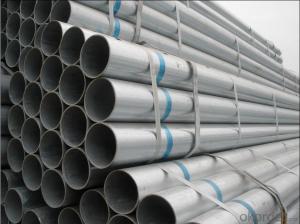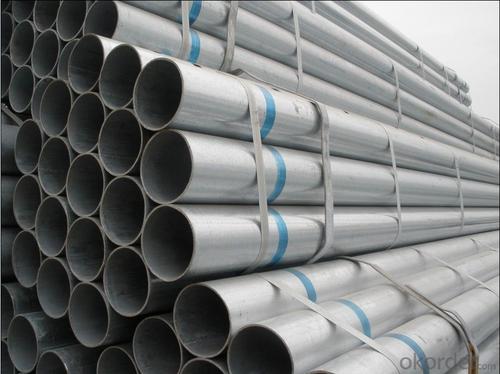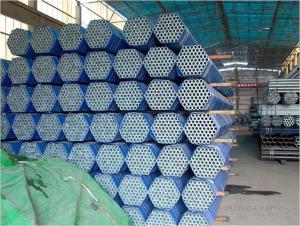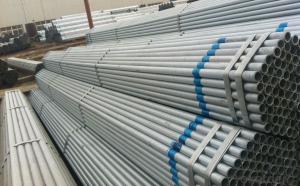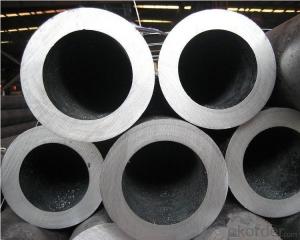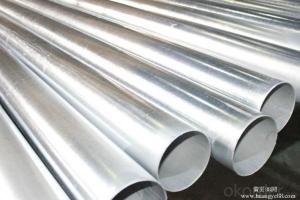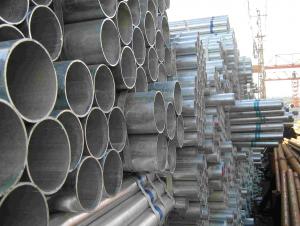BS1387 HOT DIPPED GALVANIZED PIPE
- Loading Port:
- China Main Port
- Payment Terms:
- TT OR LC
- Min Order Qty:
- -
- Supply Capability:
- -
OKorder Service Pledge
OKorder Financial Service
You Might Also Like
Hot Dip Galvanized seamless steel pipe
Standard: GB,ASTM,DIN,JIS;
Grade: 10#, 20#, 45#, 16Mn;
Length: as customer's demand
Hot Dipped Galvanized Seamless Steel Pipe
1.Standard: ASTM A106,ASTM A53,EN10255,GB/T8162,GB/T8163
2.Material: 10#,20#,ST35,ST37,ST42,ST45
3.Size OD: 18-114.3mm
WT: 2-15mm
Length: 7-12m or according to your requirement.
4.Application: oil and natural gas pipeline, water supply pipeline, boiler, fertilizer factory, chemical
industry, industrial pipeline networks, foundation, construction.
5.Surface: oiled, varnished, black-painted, galvanized, 3PE anti-corrosion, etc
6.Pipe ends:
1). plain end
2). bevelled end
3). both ends threaded, one end with plastic caps protected, the other with socket(couplings) for connecting
4). with hole for casing pipes
5). grooved ends
7.Packing:
1). In bundles, with weaving bags wrapping outside
2). In bare bundles or according to your requirement
- Q: How are steel pipes used in the manufacturing of HVAC systems?
- Steel pipes are commonly used in the manufacturing of HVAC systems for various purposes. They are used to transport fluids, such as water or refrigerants, throughout the system. Steel pipes are also used for exhaust systems and ventilation, providing a durable and corrosion-resistant solution. Additionally, steel pipes are used in the construction of HVAC equipment, such as heat exchangers and boilers, due to their strength and ability to withstand high temperatures and pressures. Overall, steel pipes play a crucial role in the efficient and reliable functioning of HVAC systems.
- Q: How are steel pipes used in wastewater treatment?
- Steel pipes are commonly used in wastewater treatment to transport and distribute the wastewater throughout the treatment facility. They are used for various purposes such as carrying raw sewage, transporting treated water, and distributing chemicals for the treatment process. Steel pipes are preferred due to their strength, durability, and resistance to corrosion, making them suitable for handling the harsh and corrosive nature of wastewater.
- Q: The difference between 12Cr1MoVG alloy steel tube and 15CrMo
- With this kind of steel manufacturing products, usually by heat treatment (normalizing and tempering); parts made before use, usually need to go through refining or chemical surface treatment (carburizing and nitriding), surface quenching or high-frequency quenching treatment. Therefore, according to the chemical composition (mainly carbon content), heat treatment process and use of different, such steel can be roughly divided into carburizing, quenching and tempering and nitriding steel three.
- Q: What's the material of Q325 steel pipe?
- Plain carbon structural steelIt's a kind of steel material. Q stands for the yield of this material, and the latter 325 means the yield value of this material, at around 325. And the yield value will decrease as the thickness of the material increases.
- Q: How are steel pipes coated to prevent corrosion?
- Steel pipes are coated to prevent corrosion using various methods and materials. One common method is applying a protective layer of paint or epoxy on the surface of the pipe. This coating acts as a barrier between the steel and the external environment, preventing moisture and corrosive substances from coming into direct contact with the metal. Another technique involves using a process called galvanization, where the steel pipes are coated with a layer of zinc. Zinc is highly resistant to corrosion and acts as a sacrificial anode, meaning it will corrode in place of the steel if any damage occurs to the coating. This sacrificial protection ensures that the steel remains intact and corrosion-free. Additionally, steel pipes can be coated with polyethylene or polypropylene materials through a process called fusion bonding. In this method, the plastic material is melted onto the steel surface, creating a strong bond that provides excellent resistance against corrosion. This type of coating is commonly used in offshore and underground pipelines. Furthermore, another technique for preventing corrosion is the application of a layer of corrosion-resistant alloy onto the steel pipe. This alloy is typically a combination of metals such as nickel, chromium, and molybdenum, which provide superior protection against corrosion in harsh environments. Overall, the choice of coating method depends on various factors such as the operating conditions, the type of corrosive substances present, and the expected lifespan of the steel pipes. By effectively applying these coatings, steel pipes can be safeguarded against corrosion, extending their durability and ensuring the integrity of the infrastructure they are used in.
- Q: Are steel pipes suitable for underground irrigation pumping?
- Yes, steel pipes are suitable for underground irrigation pumping. Steel pipes are known for their durability and strength, making them an ideal choice for underground applications. They can withstand high levels of pressure, resist corrosion, and are less likely to be affected by external factors such as soil movement or temperature changes. Additionally, steel pipes have a longer lifespan compared to other materials, reducing the need for frequent replacements. However, it is important to ensure that the steel pipes are properly coated or lined to prevent corrosion and to regularly inspect and maintain them to ensure their effectiveness and longevity.
- Q: Can steel pipes be used for underground pressure pipelines?
- Yes, steel pipes can be used for underground pressure pipelines. Steel pipes are known for their strength, durability, and resistance to corrosion, making them suitable for underground applications where pressure is present. Additionally, steel pipes can withstand high temperatures and external forces, making them an ideal choice for underground pressure pipelines.
- Q: What are the different types of steel pipe end connections?
- There are several types of steel pipe end connections, including threaded, welded, flanged, grooved, and compression fittings.
- Q: How do you transport and store steel pipes?
- Steel pipes are typically transported using trucks, railcars, or ships. They are stored in designated areas or warehouses, either vertically or horizontally depending on their size and weight. It is important to ensure proper packaging, lifting equipment, and securing methods during transport to prevent damage or accidents. Additionally, storing steel pipes in dry, well-ventilated areas away from moisture and corrosive substances helps maintain their quality and longevity.
- Q: How do steel pipes perform in seismic zones?
- Steel pipes perform well in seismic zones due to their inherent strength and ductility. Their high tensile strength allows them to withstand the horizontal forces exerted during an earthquake, while their ductility allows them to deform and absorb the energy generated by seismic activity. Additionally, steel pipes can be designed and installed with proper reinforcement and bracing systems to further enhance their performance in seismic zones.
Send your message to us
BS1387 HOT DIPPED GALVANIZED PIPE
- Loading Port:
- China Main Port
- Payment Terms:
- TT OR LC
- Min Order Qty:
- -
- Supply Capability:
- -
OKorder Service Pledge
OKorder Financial Service
Similar products
Hot products
Hot Searches
Related keywords
